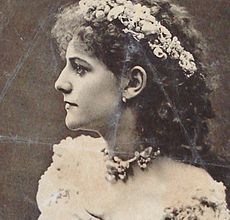Elizabeth Maria Molteno
| Elizabeth Maria Molteno | |
|---|---|
 |
|
| Born |
24 September 1852 Beaufort West, Cape Colony |
| Died | 25 August 1927 (aged 74) Trevone, United Kingdom |
| Occupation | Suffragist, civil rights activist |
Elizabeth Maria Molteno (24 September 1852 – 25 August 1927), was an early activist for civil and women's rights in South Africa.
Elizabeth was born into an influential Cape family of Italian origin. She was the oldest and much beloved daughter of John Molteno, the first Prime Minister of the Cape, and many of her 18 siblings came to hold positions of influence in business and government. She spent her earliest years in the protected surroundings of her family's Claremont estate in Cape Town, where she was educated. Her father travelled frequently, for diplomatic or business reasons, and he often let his older children accompany him on such trips. Consequently, Elizabeth travelled a great deal as a child, especially to Italy and London, and grew up to share her father's interest in politics and current affairs.
Fiercely intelligent, with a strong personality and an extraordinary memory, she developed views and habits which were unconventional for a girl in the Victorian era. "Betty", as she preferred to be called, abandoned the fine clothes and material privileges of her youth. She took on a simple lifestyle, rough clothes and vegetarianism, and showed more interest in science and politics, than in marriage and children. In her personal beliefs she claimed to be spiritual but non-religious, and she acquired a firm lifelong belief in the principles of gender and racial equality. After matriculating, she chose not to marry, but to study further at Newnham College, Cambridge.
Choosing one of the few careers that were open to women in the 19th century, she became a teacher, and then the principal of the Collegiate School for girls in Port Elizabeth. There she revolutionised the Victorian education system, which was heavily based on rote learning and was restricted to subjects that were deemed appropriate for women. She applied methods of teaching which were advanced and liberal for the time, including what was probably the first system of sex education for girls in the country. She had an ardent lifelong belief in the importance of girls' education, so much so that she refused to draw a salary for her administrative and educational work.
...
Wikipedia
